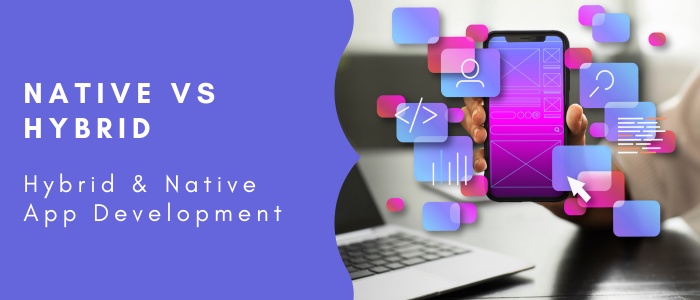In today's digital landscape, having a mobile presence is essential for businesses of all sizes. Mobile apps enable companies to engage with their customers, increase brand awareness, and provide convenient access to their products and services.
However, when it comes to Mobile App Development, one of the key decisions you'll face is choosing between a native or hybrid approach. Each approach has its own advantages and considerations, so it's crucial to understand the differences and determine which is best suited for your business.
Understanding Native and Hybrid App Development
Native apps are developed using programming languages specific to each platform, such as Swift for iOS and Java for Android. These apps are tailored to a particular platform, enabling them to deliver exceptional performance and user experience. On the other hand, hybrid apps are created using web technologies like HTML, CSS, and JavaScript. They are then encapsulated within a native wrapper, allowing them to run on multiple platforms. Hybrid apps are intended to be compatible across various devices, providing cross-platform functionality.
The fundamental distinction between native and hybrid apps lies in their optimization and platform focus. Native apps are optimized for a specific platform, resulting in a more seamless user experience. Conversely, hybrid apps prioritize cross-platform compatibility, making them suitable for targeting multiple platforms.
Comparison Between Native and Hybrid
Let's delve deeper into the characteristics and benefits of both approaches:
- Performance: When it comes to performance, native apps have the upper hand. Since they are optimized for a specific platform, they tend to deliver faster response times, smoother animations, and overall better user experience. Native apps also have access to the full range of device features and APIs, allowing developers to leverage the hardware capabilities to their fullest extent. Hybrid apps, while capable of running on multiple platforms, may experience performance limitations and a less polished user experience.
- Development Time and Cost: Hybrid apps shine when it comes to development time and cost. By using web technologies, developers can write code once and deploy it across multiple platforms, saving time and effort compared to developing separate native apps for each platform. This approach can result in cost savings, as you only need a single development team and can avoid the expenses associated with maintaining two separate codebases.
- User Experience: Native apps often provide a more seamless and intuitive user experience. They can leverage platform-specific design guidelines and UI components, resulting in an app that feels natural to users of that platform. Native apps also have access to the latest platform features and updates, ensuring a cutting-edge experience. Hybrid apps, while they can achieve a decent user experience, may face challenges in replicating the look and feel of native apps, potentially leading to a less satisfying user interface.
- Maintenance and Updates: Native apps require separate updates for each platform, which can be time-consuming and cumbersome. Hybrid apps, on the other hand, allow for simultaneous updates across platforms since they share a single codebase. This makes maintenance and feature additions more efficient, ensuring that all users have access to the latest version of the app without delays.
- Market Reach: If your target audience spans multiple platforms, a hybrid app can offer broader market reach. By developing a single app that works on both iOS and Android, you can effectively target a larger user base without the need for separate development efforts. Native apps, while providing a more optimized experience, require separate development and maintenance for each platform.
So, which approach is best for your business? The answer depends on several factors, including your target audience, budget, development timeline, and desired app performance.
Native vs. Hybrid App Development: A Comprehensive Decision-Making Cheat Sheet
1. Understanding Your Business Needs
- Assessing your specific business requirements and objectives
- Identifying target audience and platform preferences
2. Native App Development
- Exploring the benefits and considerations of native app development
- Leveraging platform-specific features and performance optimization
3. Hybrid App Development:
- Exploring the benefits and considerations of hybrid app development
- Maximizing code reusability across multiple platforms
- Streamlining development and maintenance efforts
4. User Experience and Performance:
- Analyzing the impact of native and hybrid approaches on user experience
- Evaluating performance factors such as speed, responsiveness, and animations
5. Development Time and Cost:
- Comparing the time and cost implications of native and hybrid development
- Considering factors such as development resources, complexity, and maintenance
6. Platform Compatibility and Reach:
- Assessing the target platform compatibility of native and hybrid solutions
- Evaluating potential reach across different devices and operating systems
7. Integration and Customization:
- Evaluating the ease of integrating with existing systems and APIs
- Considering the level of customization required for your app
8. App Store Approval and Updates:
- Understanding the app submission and approval processes for native and hybrid apps
- Considering the impact of updates and bug fixes on each approach
9. Developer Skill Set and Resources:
- Assessing the availability of skilled developers for native and hybrid development
- Considering your existing development team's expertise and preferences
10. Future Scalability and Adaptability:
- Evaluating the scalability and adaptability potential of native and hybrid solutions
- Anticipating future requirements and technological advancements
11. Decision-Making Checklist:
- A summarized checklist to help you weigh the pros and cons of each approach
- Considering your business needs, target audience, cost, time, user experience, and more
By referring to this comprehensive cheat sheet, you can make an informed decision on whether to choose native or hybrid app development that aligns with your business goals and requirements.
Conclusion
Making the correct choice in the app development approach holds immense significance for businesses aiming to create a prosperous mobile application. It is crucial to comprehend the distinctions between native and hybrid app development and diligently assess factors like target audience, app functionality, development timeline, and budget.
By taking these aspects into careful consideration, businesses can make informed decisions. Opting for the appropriate approach enables the creation of top-notch mobile apps that precisely cater to their unique requirements and contribute to overall growth. Therefore, it is essential not to rush the decision but rather choose wisely for long-term success!


No comments yet